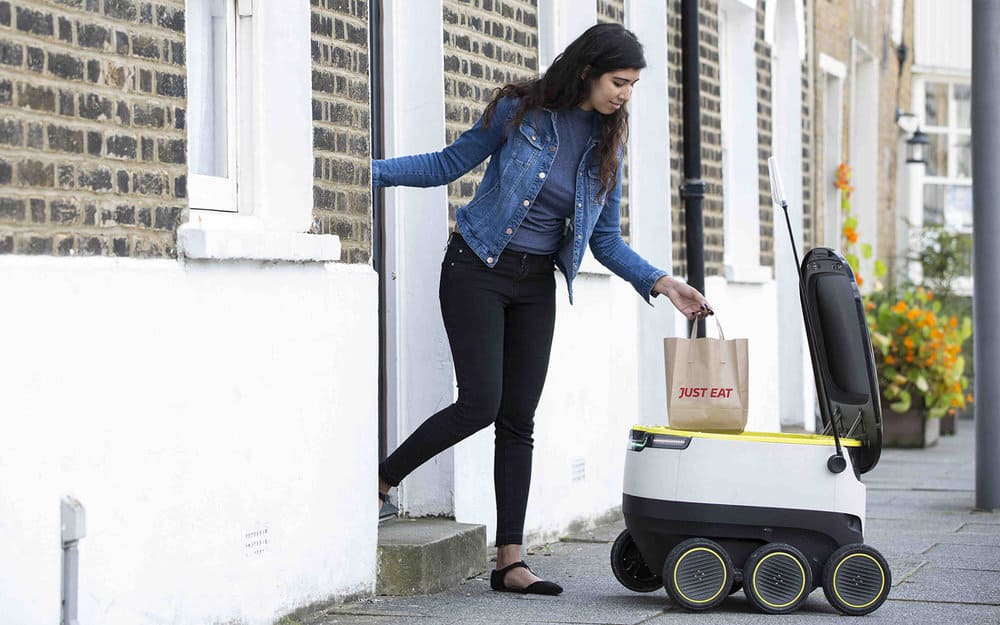
Droids and drones are just two of the methods set to disrupt parcel delivery
Package delivery has long been the sole responsibility of a carrier such as FedEx or UPS who would send a driver and a truck to your house and leave a package. That is changing, though, as retailers are taking a more proactive approach to the supply chain, hoping to reduce cost and improve the delivery experience. The result is innovation that promises to dramatically alter last-mile delivery.Popular Stories:
- ELDs and the insurance impact
- Truck lane futures contracts: A new way to boost the bottom line
- The next Internet: Autonomous trucks
In a Convoy survey, 70.1% of consumers said that a single poor delivery experience would cause them to no longer shop with that retailer. That same survey noted that 67% of retailers said that gaining greater control of the consumer experience was crucial or very important to delivery. A UPS survey last year noted that 46% of shoppers had rejected an online purchase because the delivery timeframe was not acceptable.
That is pretty strong motivation for more retailers to be involved in the last-mile delivery process.
The model of goods shipped from vendor to distribution center (DC), DC to store, and store to customer doesn’t exist anymore. Thanks to e-commerce, it has been replaced by a model that allows goods to be shipped from anywhere in the supply chain to the customer, and in some cases, anytime.
The belief has been that last-mile delivery will someday give way to drone delivery. But what if the future of last-mile delivery is not aerial drones, but rather droids, or autonomous community parcel vehicles, or even bike couriers?
Watch UPS demonstrate how drone delivery works
A McKinsey & Company report, “Parcel delivery: the future of last mile,” notes that the future of delivery features 80% of all products delivered by autonomous vehicles or drones. By 2020, the report notes, 15% of all last-mile delivery will be same-day or instant delivery.
Walmart is taking this revolution in consumer experience and delivery so seriously that last week it announced Store No. 8, an incubator that will work with start-ups seeking to disrupt the consumer experience, including e-commerce delivery. The incubator, based in Silicon Valley, will pay particular attention to those companies that are seeking solutions using virtual reality, autonomous vehicles, drone delivery, and personalized shopping.
“We’re getting back to the heart and soul of those early days where passion fueled innovation, where ‘crazy ideas’ were the norm and the only rule was to pay no attention to the way things were supposed to be done,” the Store No. 8 website announces.
But while Walmart seeks big ideas, several companies have been testing drone deliveries. The latest is parcel giant UPS. UPS conducted the test in February in Lithia, FL, with Workhorse Group, an Ohio-based battery-electric truck and drone developer. Workhorse built the drone and the electric UPS package car used in the test.
“This test is different than anything we’ve done with drones so far. It has implications for future deliveries, especially in rural locations where our package cars often have to travel miles to make a single delivery,” said Mark Wallace, UPS senior vice president of global engineering and sustainability. “Imagine a triangular delivery route where the stops are miles apart by road. Sending a drone from a package car to make just one of those deliveries can reduce costly miles driven. This is a big step toward bolstering efficiency in our network and reducing our emissions at the same time.”
Amazon, of course, is known for its vision for drone deliveries. The e-commerce retailer has envisioned a scenario where a drone pickups up a package at a warehouse and makes the delivery to your front door.
“Drones turned out to be surprisingly cost-competitive in rural areas, at only approximately 10% above the cost of today’s delivery model,” McKinsey notes. “With their higher speeds they are even better suited for same-day and time-window delivery of smaller items in rural areas.”
A recent Princeton Consultants survey of carriers and shippers, though, found that respondents are doubtful of drones ultimate impact on the industry.
“People were the most skeptical about drones having a big impact on our industry,” Steve Sashihara, CEO of Princeton Consultants, says. The survey found only 35% of respondents believe drones will have a moderate or large impact on the industry.











